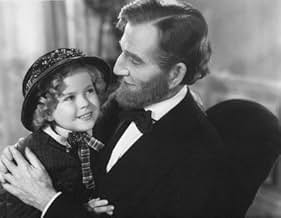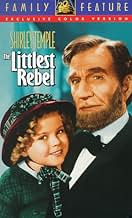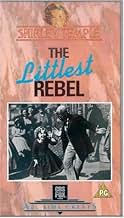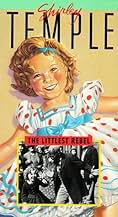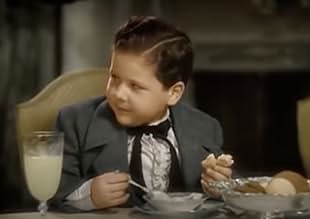IMDb-BEWERTUNG
6,7/10
1766
IHRE BEWERTUNG
Shirley Temples Vater, ein rebellischer Offizier, schleicht sich auf seine heruntergekommene Plantage zurück, um seine Familie zu sehen, und wird verhaftet.Shirley Temples Vater, ein rebellischer Offizier, schleicht sich auf seine heruntergekommene Plantage zurück, um seine Familie zu sehen, und wird verhaftet.Shirley Temples Vater, ein rebellischer Offizier, schleicht sich auf seine heruntergekommene Plantage zurück, um seine Familie zu sehen, und wird verhaftet.
- Regie
- Drehbuch
- Hauptbesetzung
- Auszeichnungen
- 4 wins total
Guinn 'Big Boy' Williams
- Sgt. Dudley
- (as Guinn Williams)
Empfohlene Bewertungen
The thing which is racist about the film is not that it sets out to show anything evil about the black people - Shirley seems to be quite fond of her slaves, unless of course they do something wrong - but in the subtle way it suggests there was nothing wrong with the situation the Deep South was in before the civil war.
The black people are not only less intelligent than the whites (notice the girl so dumb she can't even remember a single line her mother told her to memorise to impress the young white child star - or perhaps she's just so nervous in the presence of the superior species that she can't remember), but they're completely happy being enslaved.
They absolutely love being told what to do by the six year old landowner's daughter, and the neighbourhood slaves just wait around for young Shirley to lavish some attention on them.
The thing I most regret about the film was that they forced the blacks to dance and entertain their white hosts like a bunch of chained elephants or circus freaks.
Its always a bad sign when the civil war is portrayed as a distruption to the desired state of affairs, as it is here and in Gone with the Wind.
1/5
Only youngsters, who don't yet understand that the only difference between white folks and black folks is skin pigment, which only evolved from a group of people living in an ultra-sunny climate for years, will be able to enjoy this film. But perhaps its better for society if you don't show it to them - the young are so impressionable, after all.
UPDATE: Can I point out that I've noticed people don't like this review, and I'm not surprised; its intentions were so innocent, it feels a shame to accuse it of causing offense, but unfortunately, I'd still suggest this one not be shown to impressionable kids for the reasons I have outlined above.
The black people are not only less intelligent than the whites (notice the girl so dumb she can't even remember a single line her mother told her to memorise to impress the young white child star - or perhaps she's just so nervous in the presence of the superior species that she can't remember), but they're completely happy being enslaved.
They absolutely love being told what to do by the six year old landowner's daughter, and the neighbourhood slaves just wait around for young Shirley to lavish some attention on them.
The thing I most regret about the film was that they forced the blacks to dance and entertain their white hosts like a bunch of chained elephants or circus freaks.
Its always a bad sign when the civil war is portrayed as a distruption to the desired state of affairs, as it is here and in Gone with the Wind.
1/5
Only youngsters, who don't yet understand that the only difference between white folks and black folks is skin pigment, which only evolved from a group of people living in an ultra-sunny climate for years, will be able to enjoy this film. But perhaps its better for society if you don't show it to them - the young are so impressionable, after all.
UPDATE: Can I point out that I've noticed people don't like this review, and I'm not surprised; its intentions were so innocent, it feels a shame to accuse it of causing offense, but unfortunately, I'd still suggest this one not be shown to impressionable kids for the reasons I have outlined above.
The previous review of this movie begins with the question "Can you get past the racism of the era?", and concludes that you can't. I won't argue that you should "get past" the racism. Rather, I'd argue that you need to look right at it and see that it is not simple, and not just a matter of stereotypes.
Yes, Willie Best's character is an embarrassment when it is not infuriating. There's no arguing that.
But Bill Robinson's character is very different. He is the one on whom Mrs. Cary relies when her husband is at war, he is the one who makes it possible for Cary to get back to see his wife as she is dying, etc. He is also the one who makes it possible for he and little Virgie to get to Washington and, eventually, plead her father's case with President Lincoln. In short, he is the character who makes pretty much everything good happen.
Yes, there is injustice in that he should have received higher billing as a result, and he should have been in the final shot with Temple, as he was as important as her father and more important than Jack Holt. That was unfair, and though probably based on what Fox thought American audiences of the time would tolerate, nonetheless a concession to the racism of the time. But for its time, this movie is remarkably devoid of the "dumb and happy darkie" stereotypes of the time that are so infuriating.
Furthermore, little Virgie never once treats "Uncle Bill" as anything less than an equal. Nor do her parents ever treat him disparagingly.
Race relations in this movie are not perfect. But neither are they stereotypes. There is no point on zooming in on Willie Best's character and going through all the modern clichés of moral superiority, only to dismiss it. The movie deserves better than that.
Yes, the dancing by Robinson and Temple is a wonder. But this movie has other things that are worth examination as well.
Forget what you may have been told about this movie and try to watch it with an open mind. You won't waste your time.
Yes, Willie Best's character is an embarrassment when it is not infuriating. There's no arguing that.
But Bill Robinson's character is very different. He is the one on whom Mrs. Cary relies when her husband is at war, he is the one who makes it possible for Cary to get back to see his wife as she is dying, etc. He is also the one who makes it possible for he and little Virgie to get to Washington and, eventually, plead her father's case with President Lincoln. In short, he is the character who makes pretty much everything good happen.
Yes, there is injustice in that he should have received higher billing as a result, and he should have been in the final shot with Temple, as he was as important as her father and more important than Jack Holt. That was unfair, and though probably based on what Fox thought American audiences of the time would tolerate, nonetheless a concession to the racism of the time. But for its time, this movie is remarkably devoid of the "dumb and happy darkie" stereotypes of the time that are so infuriating.
Furthermore, little Virgie never once treats "Uncle Bill" as anything less than an equal. Nor do her parents ever treat him disparagingly.
Race relations in this movie are not perfect. But neither are they stereotypes. There is no point on zooming in on Willie Best's character and going through all the modern clichés of moral superiority, only to dismiss it. The movie deserves better than that.
Yes, the dancing by Robinson and Temple is a wonder. But this movie has other things that are worth examination as well.
Forget what you may have been told about this movie and try to watch it with an open mind. You won't waste your time.
There are two very good opportunities afforded by this film. One, it's entertaining, fast-paced, and Shirley really shines.
The second is a chance to talk to your children about the way black characters and white characters interact in this film. Some younger children may be confused by the divide between the black characters and the white characters (especially those who attend racially-diverse schools,) but this is a good time to explain to them the racist attitudes of the time period, and ask them how it makes them feel.
The best way to combat racism is not to sweep it under the rug, but to teach children where we were, how far we've come, and how far we still need to go. Give children the credit they deserve, they will understand.
This film is a perfect opportunity to relate to your children and instill guidance.
The second is a chance to talk to your children about the way black characters and white characters interact in this film. Some younger children may be confused by the divide between the black characters and the white characters (especially those who attend racially-diverse schools,) but this is a good time to explain to them the racist attitudes of the time period, and ask them how it makes them feel.
The best way to combat racism is not to sweep it under the rug, but to teach children where we were, how far we've come, and how far we still need to go. Give children the credit they deserve, they will understand.
This film is a perfect opportunity to relate to your children and instill guidance.
This was the first Shirley Temple movie I ever watched (on VSH....hey, I'm not THAT old) and I still consider it one of her best.
That's because it has a great mixture of drama, comedy, song/dance and suspense. Almost all the characters are likable. The two dances scenes with Temple and Bill Robinson are excellent....a joy to watch. I don't know if Shirley ever looked cuter than in this film. She runs the gamut of emotions in here quite frequently.
The 74-minute story never has a lull. John Boles and Karen Moreley are people you root for, Willie Best provides good comedy and there is a surprising amount of suspense.
Overall, however, this is simply a sweet, sentimental film that leaves you feeling good after watching it.....and what's wrong with that?
That's because it has a great mixture of drama, comedy, song/dance and suspense. Almost all the characters are likable. The two dances scenes with Temple and Bill Robinson are excellent....a joy to watch. I don't know if Shirley ever looked cuter than in this film. She runs the gamut of emotions in here quite frequently.
The 74-minute story never has a lull. John Boles and Karen Moreley are people you root for, Willie Best provides good comedy and there is a surprising amount of suspense.
Overall, however, this is simply a sweet, sentimental film that leaves you feeling good after watching it.....and what's wrong with that?
Was there ever such a talented little kid as Shirley Temple? She could act, sing, dance and steal scenes with the best of them. Singlehandedly, she saved 20th Century Fox from bankruptcy during the 30's and made ordinary potboilers box office successes, such as "The Littlest Rebel". Submitting to such scene larceny here are John Boles, Jack Holt and Bill "Bojangles" Robinson, who gave her competition in several dance sequences.
This picture is set in Civil War South, and steps lightly through the minefield of the racism of slavery. Not sure if this picture could be made today, as racial tensions have been stewing since the Civil Rights Act of 1965, but this was 1935, and audiences had a better historical sense than is found nowadays. Just watch and enjoy the entertainment phenomenon that was Shirley Temple, Hollywood's all-time greatest scene-stealer.
6/10 - Website no longer prints my star ratings.
This picture is set in Civil War South, and steps lightly through the minefield of the racism of slavery. Not sure if this picture could be made today, as racial tensions have been stewing since the Civil Rights Act of 1965, but this was 1935, and audiences had a better historical sense than is found nowadays. Just watch and enjoy the entertainment phenomenon that was Shirley Temple, Hollywood's all-time greatest scene-stealer.
6/10 - Website no longer prints my star ratings.
Wusstest du schon
- WissenswertesBoth John Boles and Bill Robinson nearly drowned while trying to cross a raging, 15-foot river for an escape scene that was cut from the film.
- PatzerWhen the Union soldiers are caught looting, the commanding officer orders them to be flogged. The US Army according to the "History of the United States Army" stopped flogging at the beginning of the Civil War in 1861--this scene is obviously later in the war as Union forces are occupying the south.
- Zitate
Virginia 'Virgie' Cary: [singing] Oh, I eat watermelon and I have for years. Sing Polly-Wolly-Doodle all the day! I like watermelon but it wets my ears. Sing Polly-Wolly-Doodle all the day!
- Alternative VersionenAlso available in a computer colorized version.
- VerbindungenFeatured in Of Black America: Black History: Lost, Stolen or Strayed (1968)
- SoundtracksPolly Wolly Doodle
(1880) (uncredited)
Traditional
Modified Music by Sidney Clare (1935)
Modified Lyrics by Buddy G. DeSylva (1935)
Sung by Shirley Temple with Bill Robinson
Reprised at the end by Shirley Temple
Top-Auswahl
Melde dich zum Bewerten an und greife auf die Watchlist für personalisierte Empfehlungen zu.
- How long is The Littlest Rebel?Powered by Alexa
Details
- Erscheinungsdatum
- Herkunftsland
- Sprache
- Auch bekannt als
- The Littlest Rebel
- Drehorte
- Produktionsfirma
- Weitere beteiligte Unternehmen bei IMDbPro anzeigen
- Laufzeit1 Stunde 13 Minuten
- Farbe
- Seitenverhältnis
- 1.37 : 1
Zu dieser Seite beitragen
Bearbeitung vorschlagen oder fehlenden Inhalt hinzufügen



